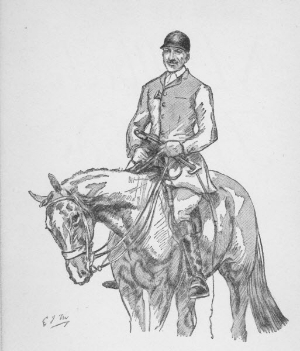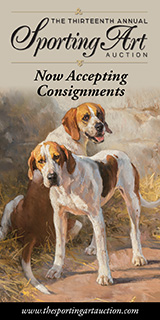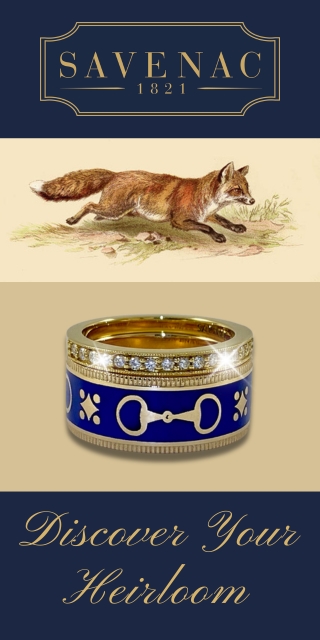 Colonel John Weatherford, MFH by Eleanor Iselin MasonGordon Grand is one of my favorite sporting authors, and his short story, “The Silver Horn,” is one of my favorite foxhunting stories. The reader is transported, in the early part of the twentieth century, to “that venerable hotel on Albemarle Street” in London, which we may readily assume is Brown’s Hotel. Colonel John Weatherford, MFH is relating Florence’s story as she told it to him upon their chance meeting in the hotel dining room after breakfast. I have extracted just the kernel of the story to reproduce here.
Colonel John Weatherford, MFH by Eleanor Iselin MasonGordon Grand is one of my favorite sporting authors, and his short story, “The Silver Horn,” is one of my favorite foxhunting stories. The reader is transported, in the early part of the twentieth century, to “that venerable hotel on Albemarle Street” in London, which we may readily assume is Brown’s Hotel. Colonel John Weatherford, MFH is relating Florence’s story as she told it to him upon their chance meeting in the hotel dining room after breakfast. I have extracted just the kernel of the story to reproduce here.
Returning from the theater and supper [Florence] had drifted off into a sound sleep, from which she was gently and fancifully awakened without sensing the cause. Her watch showed three o’clock. The roar and rumble of London had faded to its lowest murmur. A midsummer moon filtered through and illuminated the street below. What was it that had so illusively awakened the sleeper? Again she listened. The faint mellow note of a hunting horn drifted up from Piccadilly.
Now a hunting horn is one thing to some people, and a very different thing to some other people. In Mrs. Grundy’s family it represents only a noise; in Florence’s family and to Florence herself it is a mystic spring which unlocks myriad memories and pictures; so at 3 a.m. Florence was hanging far out of a front window of her hotel, her eyes searching the moonlit London street.
A solitary figure was strolling at his leisure up the center of the street. To the tutored eye of the lady of the balcony, there was the slightest tinge of a roll to his gait. The gleam of his white waistcoat, the cut of his dress coat, the sheen of his silk hat worn just a bit toward the back of the head, the cane hooked over the left arm, and—touches of touches—the gleam of a silver horn tucked between the white tie and the top shirt stud. “Mind you,” said Florence, “just exactly where a huntsman would carry it. Oh, it was too delicious.” Well, this reveler of the night halted in front of Florence’s window. Why just there, I did not enquire, but Florence had said she was hanging out of the window.
With feet far apart and leaning back on his cane, the gentle reveler plucked forth his horn, and made old Albemarle street resound. Twang. Twang. Twang. Then he warmed to his task. “Hoick, hoick! Furrier has it. Hoick! For’ard to Furrier! Hold hard, gentlemen! Hold hard, please! Ah, Rattler Boy. Hoick! For’ard to Furrier! Steady, gentlemen, please. Let hounds get out of covert. Let them get straightened away. Please don’t press hounds.” And then, in a glorious, resounding voice that rolled on from street to street, “Gone away—gone away—Hoick for’ard!” After three more sharp notes of the horn indicating that hounds had found and gone away, and as a signal and final exhortation to any hounds that might be left in covert, the horn was once more inserted between the white tie and top shirt stud.
The lone Huntsman, cheering and encouraging his hounds, passed on toward Grafton street. Hounds ran a burning line with a fine head up Albemarle street, but at The Royal Institute they dwelled on the line and faulted.
The Huntsman cast them up the noble steps of the Institute and then in a narrow service alley at the Piccadilly side of the building. In the alley he was met by the bewildered guardian hurrying out to see what the hue and cry might be.
“Hold hard, Sir. Dash it, Sir! Don’t you see hounds are casting? You will have their heads up in a minute. Hold hard!”
Then Furrier opened, the pack honored, and away they flew toward Grafton Street. Of course, Albemarle street ends at Grafton, and there was a great to-do as to whether the fox had turned right-handed to Old Bond street or left-handed to Dover street. Again hounds faulted and up went their heads. Again the twang of the horn calling hounds to him, and then patiently he cast a little way toward Old Bond—then a little toward Dover—and finally a bit back on Albemarle. On this latter cast he encountered the old guardian of the venerable Institute standing in the middle of the road, his eyes agog.
“That’s right, my man, that’s right. Never fuss about when hounds are at fault.”
“Of course I think he should have cast first toward Dover street,” said Florence, “because the breeze was blowing toward Hyde Park corner.”
Then he cast them up onto the porch of Quaritch’s, that great book shop on Grafton street, into Bunting’s, the bootmaker’s on Dover, and even as far back as Boss’s, the master gunmaker’s shop on Albemarle, probably thinking that the fox might have turned at the Institute and headed back toward Piccadilly.
At last the riddle was solved. The true line ran toward Dover Street and so down Little Hay Hill where Huntsman and horn drifted out of hearing; but Florence said she heard the horn once more across Berkeley Square and about opposite Dartmouth House on Charles street. She said she then went to bed and to sleep, but I rather think she fell to romancing.
When I stopped at the mail desk, a ruby-faced old gentleman was saying to the mail clerk, “I say, what a go that young chap was having last night—splendid voice for a huntsman—splendid! Reminded me of my days with the Earl of Fitzwilliams’ hounds. When I heard him turn down Little Hay Hill I said to myself, ‘Ah, now there’s a sweet stretch to watch hounds race down.’ Blest if I could get back to sleep for an hour. Of course, I thought it a bit nervy to call his hound Furrier, after George Osbaldeston’s great hound, but it might jolly well be that he thought he was the Squire or old Meynell. Oh, youth—that’s the thing—youth! When you get to be my age it’s a grand thing to know that you made good use of it.”
The old gentleman pulled on his gloves, squared his shoulders, slipped his stick on his arm, and marched off, looking, I thought, very fit.
Posted February 28, 2013
“The Silver Horn” is but one of Gordon Grand’s stories in a book titled The Silver Horn: And Other Sporting Tales of John Weatherford. It was first published by The Derrydale Press in 1932, republished in 1991, and has been acknowledged by many as the best American foxhunting fiction ever published. Though out-of-print now, used books are available online from abebooks.com at seriously lower prices than from Amazon.

















